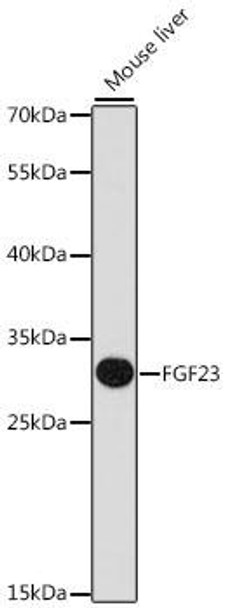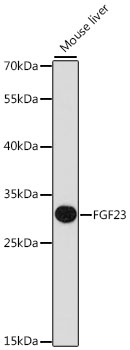Anti-FGF23 Antibody (CAB14073)
- SKU:
- CAB14073
- Product type:
- Antibody
- Reactivity:
- Mouse
- Host Species:
- Rabbit
- Isotype:
- IgG
- Antibody Type:
- Polyclonal Antibody
- Research Area:
- Developmental Biology
Description
| Antibody Name: | Anti-FGF23 Antibody |
| Antibody SKU: | CAB14073 |
| Antibody Size: | 20uL, 50uL, 100uL |
| Application: | WB |
| Reactivity: | Mouse |
| Host Species: | Rabbit |
| Immunogen: | A synthetic peptide corresponding to a sequence within amino acids 100-200 of human FGF23 (NP_065689.1). |
| Application: | WB |
| Recommended Dilution: | WB 1:500 - 1:2000 |
| Reactivity: | Mouse |
| Positive Samples: | Mouse liver |
| Immunogen: | A synthetic peptide corresponding to a sequence within amino acids 100-200 of human FGF23 (NP_065689.1). |
| Purification Method: | Affinity purification |
| Storage Buffer: | Store at -20°C. Avoid freeze / thaw cycles. Buffer: PBS with 0.02% sodium azide, 50% glycerol, pH7.3. |
| Isotype: | IgG |
| Sequence: | GNIF GSHY FDPE NCRF QHQT LENG YDVY HSPQ YHFL VSLG RAKR AFLP GMNP PPYS QFLS RRNE IPLI HFNT PIPR RHTR SAED DSER DPLN VLKP RARM T |
| Gene ID: | 8074 |
| Uniprot: | Q9GZV9 |
| Cellular Location: | Secreted |
| Calculated MW: | 27kDa |
| Observed MW: | 30kDa |
| Synonyms: | FGF23, ADHR, FGFN, HPDR2, HYPF, PHPTC |
| Background: | This gene encodes a member of the fibroblast growth factor family of proteins, which possess broad mitogenic and cell survival activities and are involved in a variety of biological processes. The product of this gene regulates phosphate homeostasis and transport in the kidney. The full-length, functional protein may be deactivated via cleavage into N-terminal and C-terminal chains. Mutation of this cleavage site causes autosomal dominant hypophosphatemic rickets (ADHR). Mutations in this gene are also associated with hyperphosphatemic familial tumoral calcinosis (HFTC). |
| UniProt Protein Function: | FGF23: Regulator of phosphate homeostasis. Inhibits renal tubular phosphate transport by reducing SLC34A1 levels. Upregulates EGR1 expression in the presence of KL. Acts directly on the parathyroid to decrease PTH secretion. Regulator of vitamin-D metabolism. Negatively regulates osteoblast differentiation and matrix mineralization. Defects in FGF23 are the cause of autosomal dominant hypophosphataemic rickets (ADHR). ADHR is characterized by low serum phosphorus concentrations, rickets, osteomalacia, leg deformities, short stature, bone pain and dental abscesses. Defects in FGF23 are a cause of hyperphosphatemic familial tumoral calcinosis (HFTC). HFTC is a severe autosomal recessive metabolic disorder that manifests with hyperphosphatemia and massive calcium deposits in the skin and subcutaneous tissues. Belongs to the heparin-binding growth factors family. |
| UniProt Protein Details: | Protein type:Secreted, signal peptide; Secreted; Cytokine Chromosomal Location of Human Ortholog: 12p13.3 Cellular Component: extracellular space; extracellular region Molecular Function:growth factor activity; type 1 fibroblast growth factor receptor binding Biological Process: epidermal growth factor receptor signaling pathway; negative regulation of bone mineralization; phosphoinositide-mediated signaling; fibroblast growth factor receptor signaling pathway; cellular phosphate ion homeostasis; nerve growth factor receptor signaling pathway; positive regulation of transcription, DNA-dependent; negative regulation of hormone secretion; insulin receptor signaling pathway; innate immune response; negative regulation of osteoblast differentiation; phosphate ion homeostasis; cell differentiation; phosphate metabolic process; vitamin D catabolic process Disease: Hypophosphatemic Rickets, Autosomal Dominant |
| NCBI Summary: | This gene encodes a member of the fibroblast growth factor family of proteins, which possess broad mitogenic and cell survival activities and are involved in a variety of biological processes. The product of this gene regulates phosphate homeostasis and transport in the kidney. The full-length, functional protein may be deactivated via cleavage into N-terminal and C-terminal chains. Mutation of this cleavage site causes autosomal dominant hypophosphatemic rickets (ADHR). Mutations in this gene are also associated with hyperphosphatemic familial tumoral calcinosis (HFTC). [provided by RefSeq, Feb 2013] |
| UniProt Code: | Q9GZV9 |
| NCBI GenInfo Identifier: | 13626688 |
| NCBI Gene ID: | 8074 |
| NCBI Accession: | Q9GZV9.1 |
| UniProt Secondary Accession: | Q9GZV9,Q4V758, |
| UniProt Related Accession: | Q9GZV9 |
| Molecular Weight: | |
| NCBI Full Name: | Fibroblast growth factor 23 |
| NCBI Synonym Full Names: | fibroblast growth factor 23 |
| NCBI Official Symbol: | FGF23 |
| NCBI Official Synonym Symbols: | ADHR; FGFN; HYPF; HPDR2; PHPTC |
| NCBI Protein Information: | fibroblast growth factor 23; phosphatonin; tumor-derived hypophosphatemia inducing factor |
| UniProt Protein Name: | Fibroblast growth factor 23 |
| UniProt Synonym Protein Names: | Phosphatonin; Tumor-derived hypophosphatemia-inducing factorCleaved into the following 2 chains:Fibroblast growth factor 23 N-terminal peptide; Fibroblast growth factor 23 C-terminal peptide |
| Protein Family: | Fibroblast growth factor |
| UniProt Gene Name: | FGF23 |
| UniProt Entry Name: | FGF23_HUMAN |







